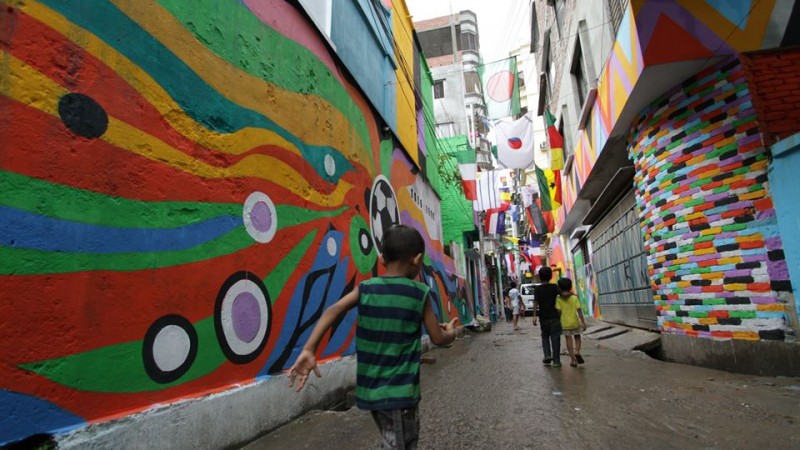Finally, Bangladeshi bloggers have grasped the power of blogs on the internet and are truly exercising their freedom of expression to make changes in their lives and society…writes Saad Hammadi
Jyoti was pleased by the news of the successful separation of Bangladeshi conjoined twins, Trishna and Krishna at Melbourne’s Royal Children’s Hospital and so, she posted her pleasure on the Unheard Voice blog.
‘I wake up every morning with TV news, and it’s rare that I hear the word “Bangladesh” uttered,’ she mentioned in her post. That she is not in the country is apparent from her post.
j@shadakalo is witty when it comes to making sarcasm about some of the inconvenient news or state of affairs. The pseudonymous blogger’s latest post, ‘Momma’s boy’ at E-Bangladesh blog mocks the presidential pardon awarded to Awami League presidium member Sajeda Chowdhury’s son, while he was absconding.
The shutdown of the Tibet exhibition at the Drik Gallery in November last year, drew in massive criticism on the blogs of E-Bangladesh, ShahidulNews, Shada Kalo blog, Unheard Voices blog, Docstrangelove and many more.
While these are merely three anecdotes of how blogs have transformed into a mouthpiece for every global citizen, they are evolving everyday and growing from strength to strength.
In the late 1990s when internet users started to increase in Bangladesh, the craze among the teen revolved around the internet relay chat (IRC). The communication soon picked up in the threads of online forums and discussion groups.
In 2003, there were only a handful of bloggers in the country. But today, the spread of bloggers is almost incalculable. They are celebrating their freedom of speech and expression to the full and using the power of words, visuals, voice and videos, they are drawing global attention on issues that would otherwise have gone largely unnoticed.
These are the new generation of pressure groups for the state and other stakeholders. They are succeeding in doing what even the mainstream media sometimes falls short of.
Take for instance the tenure of the military backed interim government when the print and electronic media were under close supervision of the state agencies. Restrictions were imposed on news items and critical statements about the government.
This is when the bloggers proved the power of citizenry journalism. Facts, news, opinions and criticism that could not have been reported on the mainstream media stormed in on blogs.
The release of jailed cartoonist Arifur Rahman in 2007 also partially owes to the pressure exerted by the bloggers. Nowadays, blogs are a medium for raising support for orphaned children and fatally ill people, demanding trial of war criminals, protesting hazardous ship breaking and the Tipaimukh dam project, among other issues.
Over the years, blogs have shifted to newer dimensions such as community blogs like ‘somewhereinblog’ and ‘narijibon’ as well as Diaspora blogs like E-Bangladesh and Unheard Voice.
Today, there is a cross section of bloggers, starting from the leader of the Communist Party of Bangladesh, to the son of current prime minister, leading economist, eminent journalists, non-resident Bangladeshis to many other individuals.
‘All in all, we can say that the blog communities are host to many of the nation’s opinion makers,’ says Arild Klokkerhaug, head of opportunities at Somewherein.
Arild’s Somewhereinblog is the first Bangla community blog in the country that popularised blogging immensely since the end of 2005 and currently hosts over 37,000 blogs with around 10,000 visitors everyday.
The power of blogs
When the landslide in 2007 killed hundreds in Chittagong, Arild initiated a campaign mobilising the bloggers’ community to help the situation. They went to Chittagong, updated the latest situation on blogs, raised funds for victims and protested against hill-cutting.
His effort was endorsed by many other bloggers like Trivuz, who pointed out how, by compromising a cigarette, a cup of tea or coffee, or a phone conversation each day, for three months, one could accumulate the amount required to save a mudslide victim.
‘This is the potential power of our blogging community, and this is a cause to unite for! Come on bloggers, let us unite for a campaign and participate with coverage and help,’ posted Arild in his blog in June 2007.
‘The power of blogging is that it harnesses the strength of the Internet and it can reach people across the world instantaneously,’ said Rezwanul Islam, who is often referred to as the dean of Bangladeshi bloggers.
With the mainstream media largely being owned or influenced by corporate companies or political parties, blogging offers an alternative platform where free thought is expected and encouraged, believes Dr Shahidul Alam, an internationally renowned photographer, journalist and blogger.
‘The interactive possibilities of blog also allow greater ownership of the reader and a multiplicity of voices that conventional media cannot offer. Depending upon the level of moderation or the public perception of the blog, it can accommodate far more diverse points of view than what the conventional media with its more straight-laced editorial limitations tends to offer.’
Some of the bloggers have gone on to perform extensive and investigative journalism. While Munshiyana, a Somewherein blogger posts an extensive piece on the history of tensions revolving around the Chittagong Hill Tracts upon completing 12 years of signing the CHT peace accord, Rezwan points out how bloggers have earlier exposed irregularities on micro-credit operations and similar stories.
The world knew about what goes on inside a Quomi Mahila Madrassah when a female Madrassah student wrote about it herself. (http: //www.somewhereinblog.net/ blog/kajori/28873366).
‘A journalist from the mainstream media cannot provide these perspectives because the girl probably would have never given an interview to a journalist on such a sensitive issue. But writing anonymously gave her the power to tell the truth,’ said Rezwan.
‘Bangladesh is a country which is marginalised in the world media, and it is the work of Bangladeshi bloggers both within and outside the country which can re-represent the country,’ believes Juditha Ohlmacher, an assistant professor of media studies and journalism at the University of Liberal Arts Bangladesh.
The western media has more often been inclined to portraying the negative stereotypes of the country. However, says Rezwan, ‘they fail to see the miracle that with a high population density, these people are resilient to the wrath of nature and are fighting back.’ The images of Bangladesh on flickr.com, captured by the amateur photographers can stun anyone and change those impressions they have perceived from the global mainstream media.
‘It is important for the students to embrace new media as a method of communication, especially to reach outside the country,’ said Juditha, who makes sure her students have a blog for themselves.
According to Arild, blogging ‘is an incredible engaging platform for storytelling’ and thus he believed marketing firms are likely to have a stronger advantage using the new media. All marketing requires is creating a buzz and thus, encouraging bloggers to share their stories, completes the job well.
‘Whether it is a mobile operator having stories to share about a mobile lifestyle, a tea brand sharing stories about the lifecycle of its product and a car dealer wanting to highlight the comfort or power of his brand, it is about creating participation,’ said Arild.
Inspiring tales
Many bloggers have transformed into writers within the span of the last four years, especially after the advent of Bangla blogs like somewhereinblog.net, sachalayatan.com, amarblog.com, prothom-aloblog.com and techtunes.com.bd.
Many first-timers have converted to regular writing while amateur writers have sharpened their skills really well, writes Farid, a somewherein blogger.
Thus, the number of books written by bloggers has been on the rise over the years.
At the Ekushey Book Fair, the bloggers have drawn a readership for their works, involving poems, stories, novels and much more. In 2008, there were some seven or eight books written by bloggers. Following the enthusiasm, last year, at least 47 books were written by bloggers targeting the 2009 Ekushey Book Fair in February.
While somewhereinblog published its third collection titled ‘Opor Bastob-3’ with selected stories from its bloggers, there were also political novels, poems, research, short stories and other collections published by different publications.
With search engines like Google enlisting blog posts, if you are writing on a burning issue like Tipaimukh, you can have your 15 minutes of fame in no time, believes Rezwan.
Across the globe, there are many critical and dissident bloggers who argue on diverse issues revolving international relations, politics and governance. Cuban blogger Yoani Sánchez shot to fame after the president of the United States, Barack Obama responded to her questions about the relationship between Cuba and US in November last year.
‘But it is not just about fame or publicity,’ said Rezwan. In the political culture currently prevalent in Bangladesh, where the parties do not have a system to value individual opinions, where a party follower cannot put forward an opinion to the leaders, ‘the blog is a useful platform to strengthen democracy, because here, people can lay out their opinions and there is a scope for a discussion in the comments section, so that the issue can be carried on further.’
Musings
What makes blogs different from the conventional media is the diversity of the issues discussed. Blogs have the capacity to make every blogger a diarist and a journalist at the same time. Thus, many bloggers prefer to write about acquaintances and experiences in the first person form as well as various issues that interest them the most.
Whether it is Rezwan’s last days in Berlin where he talks about driving for 14 hours from Berlin to Paris (1100km) and crossing four countries in a day, Alam’s encounter with the police during the Tibet exhibition or Sajeeb Wazed, the son of Prime Minister Sheikh Hasina writing about the developments of his mother’s trial during the interim government’s tenure in 2008, every post has an interest group.
‘Blogging offers the spontaneity and intimacy of a diary, and at the same time, has the enormous reach of the Internet,’ said Alam. From a literary perspective, it creates a platform where serious issues can be dealt with, in collaboration with an international audience but in a manner that does not have the weighty feel of scholarly tomes, or the machinegun approach of the live media.
‘Of course flippant and irrelevant blogs do exist,’ he said, ‘but since a blog is only as valuable as the minds it is able to gather, there is a natural filtering effect that separates a good blog from a bad one.’
Thus, one of the most interesting factors about blogging is the divulgence of musings and personal experiences. Celebrities like Amitabh Bachchan, Shobhaa De or former Vice President of USA Al Gore enjoy global readership for their personal experiences.
In case you are wondering who will find interest in your personal posts, as long as you are able to write them in an interesting manner, you may draw the attention of your friends, colleagues, family, relatives and many passionate bloggers who may willingly follow your blog.
Jyoti was pleased by the news of the successful separation of Bangladeshi conjoined twins, Trishna and Krishna at Melbourne’s Royal Children’s Hospital and so, she posted her pleasure on the Unheard Voice blog.
‘I wake up every morning with TV news, and it’s rare that I hear the word “Bangladesh” uttered,’ she mentioned in her post. That she is not in the country is apparent from her post.
j@shadakalo is witty when it comes to making sarcasm about some of the inconvenient news or state of affairs. The pseudonymous blogger’s latest post, ‘Momma’s boy’ at E-Bangladesh blog mocks the presidential pardon awarded to Awami League presidium member Sajeda Chowdhury’s son, while he was absconding.
The shutdown of the Tibet exhibition at the Drik Gallery in November last year, drew in massive criticism on the blogs of E-Bangladesh, ShahidulNews, Shada Kalo blog, Unheard Voices blog, Docstrangelove and many more.
While these are merely three anecdotes of how blogs have transformed into a mouthpiece for every global citizen, they are evolving everyday and growing from strength to strength.
In the late 1990s when internet users started to increase in Bangladesh, the craze among the teen revolved around the internet relay chat (IRC). The communication soon picked up in the threads of online forums and discussion groups.
In 2003, there were only a handful of bloggers in the country. But today, the spread of bloggers is almost incalculable. They are celebrating their freedom of speech and expression to the full and using the power of words, visuals, voice and videos, they are drawing global attention on issues that would otherwise have gone largely unnoticed.
These are the new generation of pressure groups for the state and other stakeholders. They are succeeding in doing what even the mainstream media sometimes falls short of.
Take for instance the tenure of the military backed interim government when the print and electronic media were under close supervision of the state agencies. Restrictions were imposed on news items and critical statements about the government.
This is when the bloggers proved the power of citizenry journalism. Facts, news, opinions and criticism that could not have been reported on the mainstream media stormed in on blogs.
The release of jailed cartoonist Arifur Rahman in 2007 also partially owes to the pressure exerted by the bloggers. Nowadays, blogs are a medium for raising support for orphaned children and fatally ill people, demanding trial of war criminals, protesting hazardous ship breaking and the Tipaimukh dam project, among other issues.
Over the years, blogs have shifted to newer dimensions such as community blogs like ‘somewhereinblog’ and ‘narijibon’ as well as Diaspora blogs like E-Bangladesh and Unheard Voice.
Today, there is a cross section of bloggers, starting from the leader of the Communist Party of Bangladesh, to the son of current prime minister, leading economist, eminent journalists, non-resident Bangladeshis to many other individuals.
‘All in all, we can say that the blog communities are host to many of the nation’s opinion makers,’ says Arild Klokkerhaug, head of opportunities at Somewherein.
Arild’s Somewhereinblog is the first Bangla community blog in the country that popularised blogging immensely since the end of 2005 and currently hosts over 37,000 blogs with around 10,000 visitors everyday.
The power of blogs
When the landslide in 2007 killed hundreds in Chittagong, Arild initiated a campaign mobilising the bloggers’ community to help the situation. They went to Chittagong, updated the latest situation on blogs, raised funds for victims and protested against hill-cutting.
His effort was endorsed by many other bloggers like Trivuz, who pointed out how, by compromising a cigarette, a cup of tea or coffee, or a phone conversation each day, for three months, one could accumulate the amount required to save a mudslide victim.
‘This is the potential power of our blogging community, and this is a cause to unite for! Come on bloggers, let us unite for a campaign and participate with coverage and help,’ posted Arild in his blog in June 2007.
‘The power of blogging is that it harnesses the strength of the Internet and it can reach people across the world instantaneously,’ said Rezwanul Islam, who is often referred to as the dean of Bangladeshi bloggers.
With the mainstream media largely being owned or influenced by corporate companies or political parties, blogging offers an alternative platform where free thought is expected and encouraged, believes Dr Shahidul Alam, an internationally renowned photographer, journalist and blogger.
‘The interactive possibilities of blog also allow greater ownership of the reader and a multiplicity of voices that conventional media cannot offer. Depending upon the level of moderation or the public perception of the blog, it can accommodate far more diverse points of view than what the conventional media with its more straight-laced editorial limitations tends to offer.’
Some of the bloggers have gone on to perform extensive and investigative journalism. While Munshiyana, a Somewherein blogger posts an extensive piece on the history of tensions revolving around the Chittagong Hill Tracts upon completing 12 years of signing the CHT peace accord, Rezwan points out how bloggers have earlier exposed irregularities on micro-credit operations and similar stories.
The world knew about what goes on inside a Quomi Mahila Madrassah when a female Madrassah student wrote about it herself. (http: //www.somewhereinblog.net/ blog/kajori/28873366).
‘A journalist from the mainstream media cannot provide these perspectives because the girl probably would have never given an interview to a journalist on such a sensitive issue. But writing anonymously gave her the power to tell the truth,’ said Rezwan.
‘Bangladesh is a country which is marginalised in the world media, and it is the work of Bangladeshi bloggers both within and outside the country which can re-represent the country,’ believes Juditha Ohlmacher, an assistant professor of media studies and journalism at the University of Liberal Arts Bangladesh.
The western media has more often been inclined to portraying the negative stereotypes of the country. However, says Rezwan, ‘they fail to see the miracle that with a high population density, these people are resilient to the wrath of nature and are fighting back.’ The images of Bangladesh on flickr.com, captured by the amateur photographers can stun anyone and change those impressions they have perceived from the global mainstream media.
‘It is important for the students to embrace new media as a method of communication, especially to reach outside the country,’ said Juditha, who makes sure her students have a blog for themselves.
According to Arild, blogging ‘is an incredible engaging platform for storytelling’ and thus he believed marketing firms are likely to have a stronger advantage using the new media. All marketing requires is creating a buzz and thus, encouraging bloggers to share their stories, completes the job well.
‘Whether it is a mobile operator having stories to share about a mobile lifestyle, a tea brand sharing stories about the lifecycle of its product and a car dealer wanting to highlight the comfort or power of his brand, it is about creating participation,’ said Arild.
Inspiring tales
Many bloggers have transformed into writers within the span of the last four years, especially after the advent of Bangla blogs like somewhereinblog.net, sachalayatan.com, amarblog.com, prothom-aloblog.com and techtunes.com.bd.
Many first-timers have converted to regular writing while amateur writers have sharpened their skills really well, writes Farid, a somewherein blogger.
Thus, the number of books written by bloggers has been on the rise over the years.
At the Ekushey Book Fair, the bloggers have drawn a readership for their works, involving poems, stories, novels and much more. In 2008, there were some seven or eight books written by bloggers. Following the enthusiasm, last year, at least 47 books were written by bloggers targeting the 2009 Ekushey Book Fair in February.
While somewhereinblog published its third collection titled ‘Opor Bastob-3’ with selected stories from its bloggers, there were also political novels, poems, research, short stories and other collections published by different publications.
With search engines like Google enlisting blog posts, if you are writing on a burning issue like Tipaimukh, you can have your 15 minutes of fame in no time, believes Rezwan.
Across the globe, there are many critical and dissident bloggers who argue on diverse issues revolving international relations, politics and governance. Cuban blogger Yoani Sánchez shot to fame after the president of the United States, Barack Obama responded to her questions about the relationship between Cuba and US in November last year.
‘But it is not just about fame or publicity,’ said Rezwan. In the political culture currently prevalent in Bangladesh, where the parties do not have a system to value individual opinions, where a party follower cannot put forward an opinion to the leaders, ‘the blog is a useful platform to strengthen democracy, because here, people can lay out their opinions and there is a scope for a discussion in the comments section, so that the issue can be carried on further.’
Musings
What makes blogs different from the conventional media is the diversity of the issues discussed. Blogs have the capacity to make every blogger a diarist and a journalist at the same time. Thus, many bloggers prefer to write about acquaintances and experiences in the first person form as well as various issues that interest them the most.
Whether it is Rezwan’s last days in Berlin where he talks about driving for 14 hours from Berlin to Paris (1100km) and crossing four countries in a day, Alam’s encounter with the police during the Tibet exhibition or Sajeeb Wazed, the son of Prime Minister Sheikh Hasina writing about the developments of his mother’s trial during the interim government’s tenure in 2008, every post has an interest group.
‘Blogging offers the spontaneity and intimacy of a diary, and at the same time, has the enormous reach of the Internet,’ said Alam. From a literary perspective, it creates a platform where serious issues can be dealt with, in collaboration with an international audience but in a manner that does not have the weighty feel of scholarly tomes, or the machinegun approach of the live media.
‘Of course flippant and irrelevant blogs do exist,’ he said, ‘but since a blog is only as valuable as the minds it is able to gather, there is a natural filtering effect that separates a good blog from a bad one.’
Thus, one of the most interesting factors about blogging is the divulgence of musings and personal experiences. Celebrities like Amitabh Bachchan, Shobhaa De or former Vice President of USA Al Gore enjoy global readership for their personal experiences.
In case you are wondering who will find interest in your personal posts, as long as you are able to write them in an interesting manner, you may draw the attention of your friends, colleagues, family, relatives and many passionate bloggers who may willingly follow your blog.



































